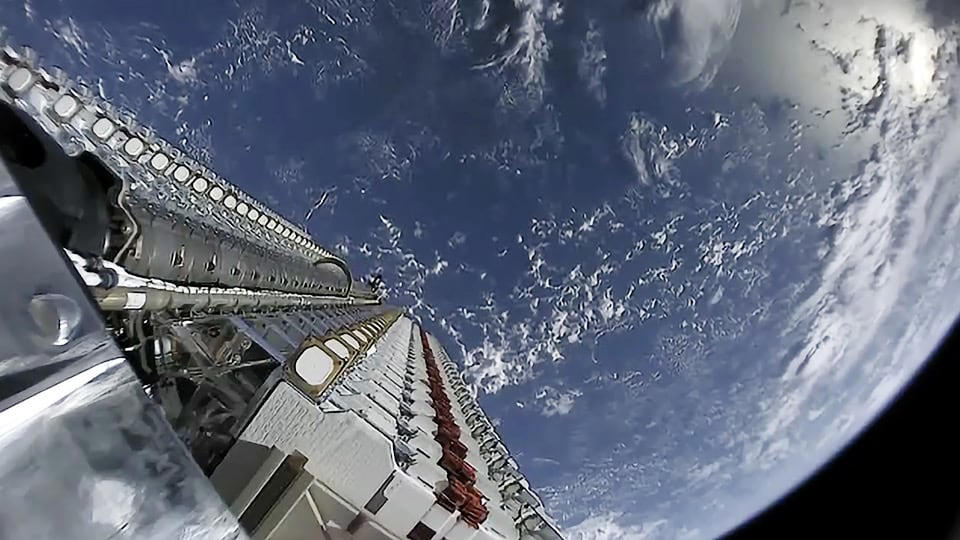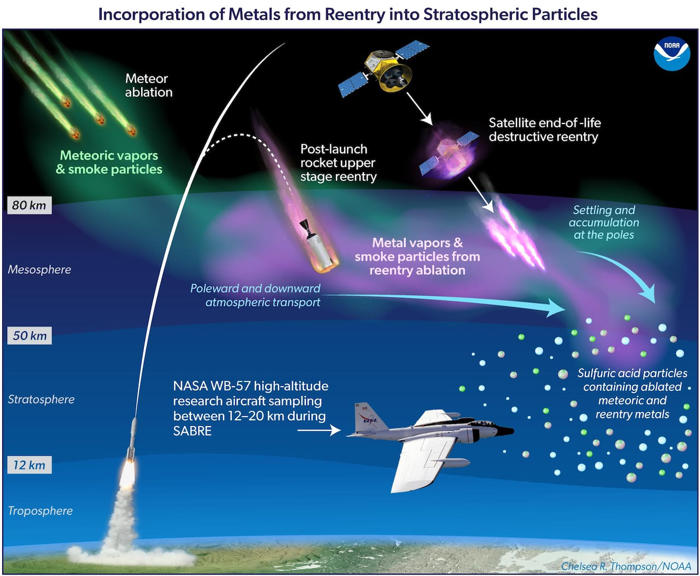Megaconstellations of satellites are burning up in our atmosphere. That could have consequences
If, on a clear night, you were to gaze up into the blackness of the sky, you would expect to see nothing but the magnificent Milky Way stretching out above you, billions of stars twinkling in place.
Instead, every few minutes or so, you will most likely also see an ersatz star breaking through an otherwise static sky, silently moving across the stars.
These are satellites, and there are thousands of them in orbit. When they've outlived their usefulness, most of them will come tumbling back down through Earth's atmosphere, burning up.
Scientists are now looking at how this process is dumping potentially harmful particles in our atmosphere. And though the exact consequences are still unknown, some are calling it a wake-up call.
'Weird metals' in the atmosphere
There are an estimated 11,500 tonnes of space objects orbiting Earth, which would include even the smallest pieces around one millimetre in size (likely satellite collisions). But there are far larger objects in space, including spent rocket stages and upwards of 9,000 functioning satellites. More than half of them are SpaceX Starlinks, which provide internet services.
As of publication, there are roughly 5,200 Starlink satellites, but SpaceX has plans to put up upwards of 42,000.

This image shows Starlink satellites shortly after being launched into space in 2019. (SpaceX)
And it's not the only company planning to launch these "megaconstellations" of satellites. Companies like OneWeb and Amazon and countries like China all have plans to put thousands more satellites in orbit.
What goes up eventually has to come down. In the case of Starlink, these satellites have a lifespan of roughly five years, after which they're deorbited. They then burn up in our atmosphere.
A new study, published last week in the journal Geophysical Research Letters, suggests that the particles left behind could potentially affect our ozone layer.
And in a study published in October in the Proceedings of the National Academy of Scientists, several scientists from the U.S. National Oceanic and Atmospheric Administration (NOAA) examined particles in the stratosphere.
The researchers were surprised to find a variety of vapourized metals in the stratosphere that they linked to satellites and spent rocket boosters.
"It actually wasn't something we were looking for," said Daniel Murphy, a chemical sciences laboratory research chemist at NOAA, who led the study.
"In looking at the data, I started seeing not just the metals you expect from meteors, which are things like iron and magnesium, but also weird metals."
The first of those was lithium, which left Murphy scratching his head, since there's almost no lithium in meteors that burn up in the atmosphere. But then more and more started popping out — in all, 20 different metals — including an excess of aluminum, as well asniobium and hafnium.
Most rockets are have large quantities of aluminum, while the cones around rocket engines contain niobium and hafnium, along with zirconium.

This illustration depicts how satellites burn up in our atmosphere, and shows how the NOAA research plane collected the particles. (Chelsea Thompson/NOAA)
"It quickly became very obvious that the source for those was was spacecraft re-entering," Murphy said. "In a way, it's a complete surprise. Nobody was thinking about it.
"But in a way, it shouldn't be a surprise, because the aluminum satellites come in, burn up.… It doesn't disappear out of the atmosphere, it's got to go somewhere."
The real surprise was the magnitude, Murphy said. These metals were found in roughly 10 per cent of sulphuric acid particles, which make up a large part of our atmosphere.
"Then you look at the launch rate projections and say, 'This is something that we need to bring to people's attention,'" Murphy said. "It's a new aspect people haven't really thought about.
"If you have 50,000 satellites, which is a number a lot of people use, and they're up five years, that's 10,000 per year re-entering," Murphy said. "That's more than one an hour."
'Wake-up call'
Canadian Maya Abou-Ghanem, another co-author on the study, agreed that the findings are concerning.
"Right now, there are really no rules to how many satellites you can bring back to Earth or deorbit," she said. "The other thing is, there's also a lot of unknown science: We don't really know the fate of these particles, what they're actually doing and if they actually are dangerous."
In the newer study, researchers similarly looked at the aluminum oxide metalscontained in the atmosphere and suggested that it could potentially harm our ozone layer, which protects us from harmful radiation.
But they caution against any definitive claims.
"Chemical reactions occurring on the surface of aluminum oxide particle causes ozone depletion," Joseph Wang, a researcher in astronautics at the University of Southern California and corresponding author of the paper, said in an email.
"This study only calculates the amount of aluminum oxide particles. We did not calculate exactly how much ozone will be depleted."
Their study found that roughly 30 kilograms of aluminum oxides are produced by the burning of a 250-kilogram satellite. In 2022, 17 tonnes of aluminum oxide nanoparticles were released into the atmosphere from satellites. And this was before Starlink satellites began to deorbit, which only started earlier this year.
Looking at the potential of megaconstellations, they estimated that 360 tonnes of aluminum oxide particles could be released annually, a 646 per cent increase above natural atmospheric levels.
"So this is a wake-up call," said Jose Ferreira, lead author of the study and an aerospace engineer and research fellow at the University of Southern California. "This is to raise the awareness ... but we need to be very careful about the message that is passed, because we need to have very concrete evidence in order to make these kind of conclusions."
The researchers are concerned that not enough thought has been put into the potential consequences of our actions when it comes to these megaconstellations.
"If humans are putting something out there, there's usually going to be some kind of anthropogenic consequence to it," Abou-Ghanem said.
"We've seen it all before. So in a way, it's not super surprising that this is happening."
